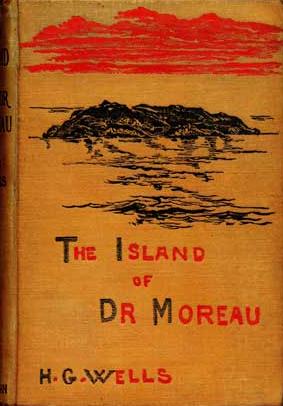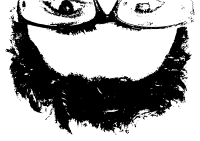📚 The Island of Doctor Moreau - H.G. Wells (1896)
This is perhaps the lesser known of the H.G. Wells sci-fi books. The premise however, is as amusing and groundbreaking for its time as the rest of his books. You can think of Dr. Moreau as the O.G. mad scientist who somehow has an entire Island at his disposal to carry out his experiments.

Like most other Wells books, we’re told the story through an inexperienced narrator. In this case it is one Edward Prendick, who finds himself shipwrecked and marooned. He is rescued by a boat carrying a suspicious passenger named Montgomery, with an even more suspicious cargo. We soon learn that Montgomery is employed by Dr. Moreau, and is tasked with ensuring the transportation of live animals to the former’s isolated Island. The captain forces Prendick to alight on the Island, which results in him taking residence at the Doctor’s compound on the shores. After hearing painful and extended squeals from Moreau’s laboratory, he realizes that the animals are undergoing some for of vivisection. Unable to bear the harsh noise, he is driven inland. During this exploration he notices strange behaviour in the island’s animal population. Their mannerisms, anatomy and gait are strangely reminiscent of humans. The foxes, pigs, dogs and other brutes eye him with what appears to be real suspicion and not just dumb fear. Some of them express emotions and even speak rudimentary words. The horrific nature of Moreau’s experiments slowly dawns on him, after he is spooked by a fox-human hybrid creature. He quickly retreats to the compound and confronts Moreau about his inhuman practices. Prendick’s subsequent encounters with the island’s inhabitants only worsen the situation. We see Moreau’s experiments increase in scope and effectiveness, without a thought to their sustainability. Eventually the whole operation careens towards an overthrowal by the island’s experimental population.
The story’s primary contention lies in Moreau’s opinion that humans are superior to all animals. He believes that all animals are imperfect and that humans have a “responsibility” to do what it takes to fix their “imperfections” i.e. to make them more human. The narrator does not agree and opposes this vehemently. Ironically Moreau meets his death at the hands of the same animals that he started out to fix. Gradually, all his experiments return their natural beast-like state implying that all the transformation he achieved was merely superficial. Moreau clearly overestimated his own ability to change the natural order of things.
The second, indirect theme is the idea of ethical treatment of living organisms. Past and current ethical rules/obligations in vivisection prohibit the kind of grotesque experiments that Moreau engages in. He represents an extreme on the scale, going all-in on experimentation, without consideration of the ethics or morals. He is expelled from his occupying university for performing experiments that did not comply with the norms. In his tunnel-visioned pursuit, he sets up shop on this remote island to further his experiments on live animals. The moral ambiguity lies in the decision-making around what is acceptable treatment of test-subjects and what is not. How do you quantify and compare the validity when multiple frameworks are presented?
The late 1800s is an interesting time to be writing about vivisection and organ transplant. None of the mainstays of modern medicine and biology like germ theory, DNA or even blood groups had made an appearance back then. It seems that the author felt that the only thing preventing us from discovering exciting new things were our ethics and morality. In contrast, someone writing a similar story today would have to either make up or disregard a fare bit of science that has been discovered since then. Regardless, the importance of science to the narrative and its consistent application will usually determine if the book is enjoyable. Since the book hardly goes into the specifics of Moreau’s experiments and focuses more on the catastrophic results, it remains in good standing more than a hundred years after its publication.
Dr. Moreau is a quaint piece of fiction; a relic of the public perception of science in the late 1800s. It can be passed in favour of the other Wells books, unless you’re on an old-school sci-fi binge like me.
Rating: (Good)
